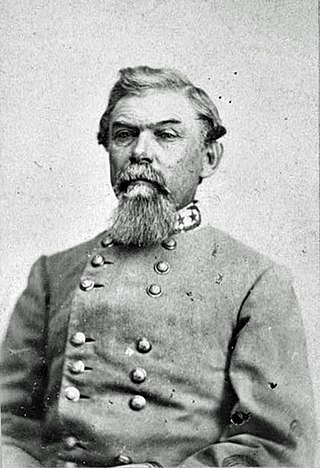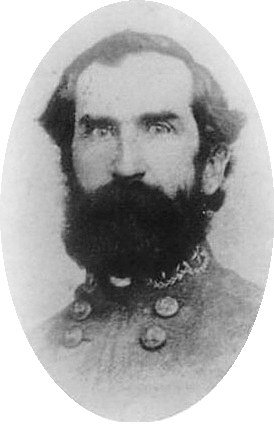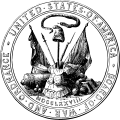Related Research Articles

William Tecumseh Sherman was an American soldier, businessman, educator, and author. He served as a general in the Union Army during the American Civil War (1861–1865), achieving recognition for his command of military strategy as well as criticism for the harshness of the scorched-earth policies that he implemented against the Confederate States. British military theorist and historian B. H. Liddell Hart declared that Sherman was "the most original genius of the American Civil War" and "the first modern general".

The Battle of Atlanta took place during the Atlanta Campaign of the American Civil War on July 22, 1864, just southeast of Atlanta, Georgia. Continuing their summer campaign to seize the important rail and supply hub of Atlanta, Union forces commanded by William Tecumseh Sherman overwhelmed and defeated Confederate forces defending the city under John Bell Hood. Union Major General James B. McPherson was killed during the battle, the second-highest-ranking Union officer killed in action during the war. Despite the implication of finality in its name, the battle occurred midway through the Atlanta campaign, and the city did not fall until September 2, 1864, after a Union siege and various attempts to seize railroads and supply lines leading to Atlanta. After taking the city, Sherman's troops headed south-southeastward toward Milledgeville, the state capital, and on to Savannah with the March to the Sea.

William Joseph Hardee was a career U.S. Army and Confederate States Army officer. For the U.S. Army, he served in the Second Seminole War and in the Mexican–American War, where he was captured and exchanged. In the American Civil War, he sided with the South and became a general. Hardee served in the Western Theater and quarreled sharply with two of his commanding officers, Braxton Bragg and John Bell Hood. He served in the Atlanta Campaign of 1864 and the Carolinas Campaign of 1865, where he surrendered with General Joseph E. Johnston to William Tecumseh Sherman in April. Hardee's writings about military tactics were widely used on both sides in the conflict.

The Army of the Tennessee was a Union army in the Western Theater of the American Civil War, named for the Tennessee River. A 2005 study of the army states that it "was present at most of the great battles that became turning points of the war—Fort Donelson, Vicksburg, and Atlanta" and "won the decisive battles in the decisive theater of the war."

Henry Warner Slocum Sr., was a Union general during the American Civil War and later served in the United States House of Representatives from New York. During the war, he was one of the youngest major generals in the Army and fought numerous major battles in the Eastern Theater and in Georgia and the Carolinas. While commanding a regiment, a brigade, a division, and a corps in the Army of the Potomac, he saw action at First Bull Run, the Peninsula Campaign, Harpers Ferry, South Mountain, Antietam, and Chancellorsville.

Benjamin Henry Grierson was a music teacher, then a career officer in the United States Army. He was a cavalry general in the volunteer Union Army during the Civil War and later led troops in the American Old West.

The Army of the Cumberland was one of the principal Union armies in the Western Theater during the American Civil War. It was originally known as the Army of the Ohio.

John Alexander McClernand was an American lawyer, politician, and a Union Army general in the American Civil War. He was a prominent Democratic politician in Illinois and a member of the United States House of Representatives before the war. McClernand was firmly dedicated to the principles of Jacksonian democracy and supported the Compromise of 1850.

The Chickamauga campaign of the American Civil War was a series of battles fought in northwestern Georgia from August 21 to September 20, 1863, between the Union Army of the Cumberland and Confederate Army of Tennessee. The campaign started successfully for Union commander William S. Rosecrans, with the Union army occupying the vital city of Chattanooga and forcing the Confederates to retreat into northern Georgia. But a Confederate attack at the Battle of Chickamauga forced Rosecrans to retreat back into Chattanooga and allowed the Confederates to lay siege to the Union forces.

Frederick Steele was a career military officer in the United States Army, serving in the Mexican-American War, the Yuma War, and as a major general in the Union Army during the American Civil War. He was most noted for retaking much of secessionist Arkansas for the Union cause, escaping the besieged port-city of Camden through successful deception tactics, and defeating Sterling Price and E. Kirby Smith at Jenkins Ferry.

The Carolinas campaign, also known as the campaign of the Carolinas, was the final campaign conducted by the Union Army against the Confederate Army in the Western Theater of the American Civil War. On January 1, Union Maj. Gen. William T. Sherman advanced north from Savannah, Georgia, through the Carolinas, with the intention of linking up with Union forces in Virginia. The campaign culminated in the defeat of Confederate Gen. Joseph E. Johnston's army at the Battle of Bentonville, and its unconditional surrender to Union forces on April 26, 1865. Coming just two weeks after the defeat of Robert E. Lee's army at the Battle of Appomattox Court House, it signaled that the war was effectively over.

The western theater of the American Civil War encompassed major military operations in the states of Alabama, Georgia, Florida, Mississippi, North Carolina, Kentucky, South Carolina and Tennessee, as well as Louisiana east of the Mississippi River. Operations on the coasts of these states, except for Mobile Bay, are considered part of the Lower Seaboard Theater. Most other operations east of the Appalachian Mountains are part of the eastern theater. Operations west of the Mississippi River took place in the trans-Mississippi theater.
A political general is a general officer or other military leader without significant military experience who is given a high position in command for political reasons, through political connections, or to appease certain political blocs and factions.

Eli Long was a general in the Union Army during the American Civil War.

Peter Joseph Osterhaus was a German-American Union Army general in the American Civil War and later served as a diplomat.

The conclusion of the American Civil War commenced with the articles of surrender agreement of the Army of Northern Virginia on April 9, at Appomattox Court House, by General Robert E. Lee and concluded with the surrender of the CSS Shenandoah on November 6, 1865, bringing the hostilities of the American Civil War to a close. Legally, the war did not end until a proclamation by President Andrew Johnson on August 20, 1866, when he declared "that the said insurrection is at an end and that peace, order, tranquillity, and civil authority now exist in and throughout the whole of the United States of America."

John King Jackson was an American lawyer and soldier. He served as a Confederate general during the American Civil War, mainly in Florida and the Western Theater of the conflict. Afterward Jackson resumed his law practice until dying from pneumonia a year after the war ended.

Joseph Dana Webster was an American civil engineer and soldier most noted for administrative services during the American Civil War, where he served as chief of staff to both Ulysses S. Grant and William T. Sherman.

On the onset of the American Civil War in April 1861, Ulysses S. Grant was working as a clerk in his father's leather goods store in Galena, Illinois. When the war began, his military experience was needed, and congressman Elihu B. Washburne became his patron in political affairs and promotions in Illinois and nationwide.

Thomas Harrison was a Confederate States Army brigadier general during the American Civil War. He had a law practice in Waco, Texas, after moving to Texas in 1843. He was a Mexican–American War veteran and Texas state legislator before the war. After the war, he was a district judge at Waco and was a Democratic Party politician and Presidential elector.
References
- Eicher, John H., & Eicher, David J., Civil War High Commands, Stanford University Press, 2001, ISBN 0-8047-3641-3.
